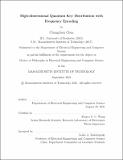High-dimensional Quantum Key Distribution with Frequency Encoding
Author(s)
Chen, Changchen
DownloadThesis PDF (11.92Mb)
Advisor
Wong, Franco N. C.
Terms of use
Metadata
Show full item recordAbstract
Time-energy entanglement is a quintessential resource for emerging quantum technologies. In this thesis, we harness this resource for applications such as quantum communication and quantum networking. In the first part of this thesis, we demonstrate an indistinguishable heralded single-photon source, featuring time-energy entanglement elimination in the spontaneous parametric down-conversion (SPDC) process through custom engineering of phase-matching conditions. The heralded single-photon source is useful in measurement-based quantum applications, where indistinguishable single photons are required to ensure high-visibility photon-photon interference.
The second part of this thesis studies the time-domain characterization of timeenergy entangled photon pairs. We present here the first experimental demonstration of the conjugate-Franson interferometer (CFI). We show that the CFI visibility can certify time-energy entanglement and detect the biphoton spectral phase, which Franson interferometry and Hong-Ou-Mandel interferometry are incapable of.
In the final part of this thesis, we show an experimental demonstration of high-dimensional quantum key distribtuion (QKD) protocol with frequency-bin encoding using time-energy entangled photon pairs. We used programmable frequency filters to obtain 16 frequency bins for key generation within a 640 GHz flat spectrum in the telecommunication wavelength band. The security of the protocol was safeguarded by the CFI visibility being measured at the same time of the key generation process. Over a 137-meter fiber link, we measured a secure photon information efficiency (PIE) of 0.6 bit/coincidence, corresponding to a secret key rate (SKR) of 42.6 kbits/s.
Date issued
2021-09Department
Massachusetts Institute of Technology. Department of Electrical Engineering and Computer SciencePublisher
Massachusetts Institute of Technology